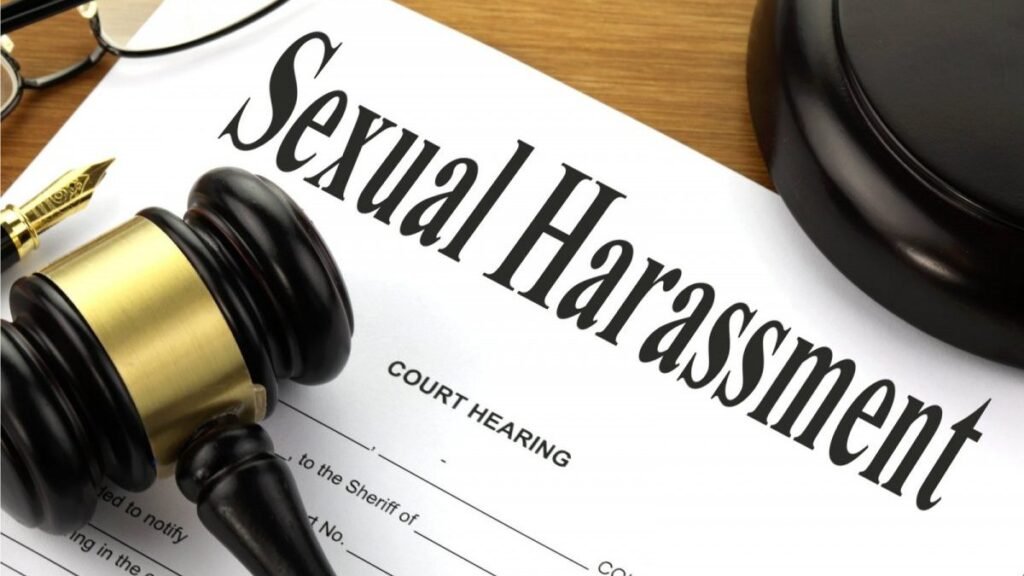Breaking the Silence: Dealing with Sexual Harassment in the Workplace

Sexual harassment in the workplace is a pervasive and insidious problem that affects millions of employees worldwide. Despite its prevalence, many victims suffer in silence, fearing retaliation, stigma, or damage to their careers. However, it’s essential to provide employees with the knowledge and tools to address and prevent sexual harassment.
*What is Sexual Harassment?*
Sexual harassment is a sexual discrimination that violates the VAPP Act. Sexual harassment includes unwelcome sexual advances, requests for sexual favors, and other verbal or physical sexual conduct.
In a workplace, the perpetrators of this behavior can be colleagues, supervisors, or even clients, and can have severe consequences for the victim’s well-being, job performance, and career advancement.

*How To Spot Signs of Sexual Harassment*
Sometimes, identifying sexual harassment can be challenging, especially if the behavior is subtle or masked as “friendly” or “banter.” However, below are some common signs of sexual harassment:
– Unwanted touching, grabbing, or fondling
– Sexual comments, jokes, or gestures
– Requests for sexual favors or dates
– Displaying explicit or suggestive images
– Staring or making suggestive sounds
*Reporting Sexual Harassment*
If you’re experiencing sexual harassment at work, it’s important to report the behavior to your employer. Here are some steps to follow:
1. *Document the incidents*: If there’s one thing you should know now is the power of keeping receipts. You should keep a record of the times, dates, locations, and details of the harassment.
2. *Report to your supervisor or HR*: Ensure you inform your HR department or supervisor about the harassment. Provide them with a copy of your documentation and ask for their help in resolving the issue.
3. *File a formal complaint*: If your employer has a formal complaint process, follow it to the T. This will help ensure your complaint is investigated and addressed.
4. *Report to the Police*: If after doing the above, your employer is not taking effective action about your complaint, or if your employer is the perpetrator, report them to the police and get a lawyer if you can.
*Still, on this topic, I would like to use Senator Natasha Akpoti-Uduaghan as a case study for workplace sexual harassment.*

Recently, Senator Natasha Akpoti-Uduaghan, a Nigerian lawmaker, accused Senate President Godswill Akpabio of sexual harassment. Her allegations have sparked outrage and debate about workplace harassment in Nigeria.
However, the Nigerian Senate Committee on Ethics, Privileges, and Public Petitions declared the petition “dead on arrival” because of a technicality, citing Order 40(4) of the Senate rules, which states that no senator may present a petition signed by themselves. The committee deemed Senator Akpoti-Uduaghan’s petition invalid because she signed it herself.
The decision sparked a heated debate, with Senate Chief Whip Senator Mohammed Monguno arguing they must strictly follow the senate’s rules to avoid chaos and anarchy. Senator Monguno also noted that it was already sub judice, as Senator Akpoti-Uduaghan had taken the case to court, and the wife of Senate President, Mrs. Unoma Godswill Akpabio has equally filed a lawsuit against Sen. Akpoti-Uduaghan.
While I commend the House for being confident in its leadership, I believe it’s important to protect all members as far as fairness is concerned. I’m not impressed at how some senators have approached the case. Starting from Deputy Chief Whip Senator Onyekachi Nwaebonyi, who, during an interview on Arise TV on Monday, March 3, 2025, stated that he was present at Akpabio’s birthday celebration on December 8, 2023, where the alleged incident was said to have occurred. He is sure that at no point did the Senate President, Godswill Akpabio, make inappropriate remarks toward Sen. Akpoti-Uduaghan.

Sen. Nwaebonyi also accused Senator Natasha Akpoti-Uduaghan of having six children with different men, which is a false claim as records show that she has three children. Even if Sen. Akpoti-Uduaghan has multiple children for multiple men, it doesn’t make any form of sexual harassment towards her permissible, and she is, by every right, entitled to protection from the law.
I see people use this strategy Sen. Nwaebonyi used too often. His strategy was to deflect allegations by presenting the woman as promiscuous, therefore, discrediting or trivializing her sexual harassment claims.
The controversy surrounding Senator Akpoti-Uduaghan’s petition has led to protests outside the National Assembly Complex. The protesters, led by one lawyer to Senator Akpoti, Victor Giwa, with a crowd of pro-Senator Akpoti’s supporters from Kogi Central Senatorial District, carried placards, banners, and a national flag calling for Senator Akpabio’s resignation to allow for an unbiased investigation.

Giwa claimed that his law firm had secured a court injunction to stop the Senate Committee on Ethics from considering the earlier petition against her conduct in the senate session on seat allocation last month. The protesters said because the senate president appointed the committee members, they could not expect the members of the committee to dispense justice without bias.
And I agree with them. If we are to take the attitudes of other senators toward Sen. Akpoti’s allegations and petition into consideration, I believe she would not receive a fair hearing from the House. Most senators have made up their minds about the Senate president’s innocence.
As of March 6, 2025, Nigerian lawmakers have suspended Senator Akpoti for six months. Some senators led by the Minority Leader of the Senate, Abba Moro, pleaded for mercy and a mitigation option. Moro recommended a three month’s suspension, but a majority voted to stick with the six-month suspension recommended by the ethics committee.
During the suspension, Sergeant-at-Arms immediately sealed Senator Akpoti-Uduaghan’s office, so she will not have access to it and she cannot be seen in the National Assembly premises. Additionally, her salary and those of her legislative aides will be withdrawn.

Senator Akpabio has denied the allegations, stating that he has always upheld respect for women and was even awarded the most gender-friendly governor in Nigeria.
But In 2020, while Sen. Akpabio, the most gender-friendly governor, was still Minister of Niger Delta Affairs, Joy Nunieh, who was the Acting Managing Director of the Niger Delta Development Commission (NDDC), also accused Hon. Akpabio of harassment on national TV and proclaimed that she had to slap sense into him to leave her alone. Senator Akpabio later denied the allegation. He didn’t press legal charges against the former NDDC director, which makes people raise an eyebrow. For a man of that position, a lawsuit should follow such allegations, if untrue.
Sen. Akpoti has also reportedly accused former presidential aide Reno Omokri of sexually harassing her. Omokri denied the allegations and threatened to sue, as he was out of the country at the time the incident was said to have occurred. Reno Omokri and Sen. Akpoti settled the issue out of court, with the Senator withdrawing her allegations.
With the information above, it is clear this isn’t the first time both parties have been involved in sexual harassment allegations. Because of this, I am sitting on the fence even though I am not and will never support sexual harassment or gender-based violence.
Sen. Akpoti did well by taking the case to court, and I’m interested in seeing how it all plays out. Remember, Sen. Akpabio is innocent until proven guilty before the law.
*Let’s talk about ways to prevent sexual harassment in the workplace.*
Preventing sexual harassment requires a proactive approach from employers and employees. Here are some strategies to create a harassment-free workplace:
1. Create a safe working environment where employees can freely report such incidents without fear of being shunned.
2. Establish a clear policy that prohibits sexual harassment and outlines serious consequences for perpetrators.
2. Educate employees about sexual harassment, its effects, and how to report incidents.
3. Investigate all reports of harassment promptly and thoroughly, and take appropriate action against perpetrators.

*Conclusion*
Sexual harassment in the workplace is a serious issue that requires immediate attention. Employers can protect employees’ rights and dignity by implementing the strategies highlighted in this article.
What do you think about Senator Natasha Akpoti’s case? Do you think the senate’s move to suspend her is about shielding the powerful from taking accountability or it’s a move to maintain decorum in the senates? Share your thoughts below.
Article by Esther Omotola.





**mitolyn official**
Mitolyn is a carefully developed, plant-based formula created to help support metabolic efficiency and encourage healthy, lasting weight management.